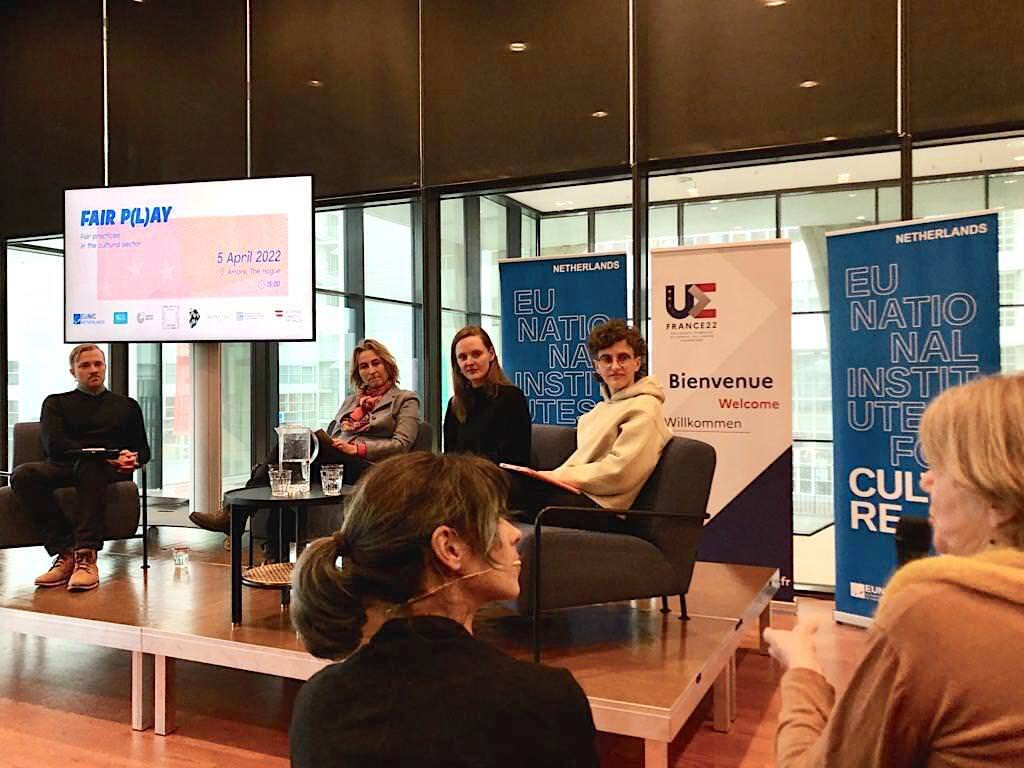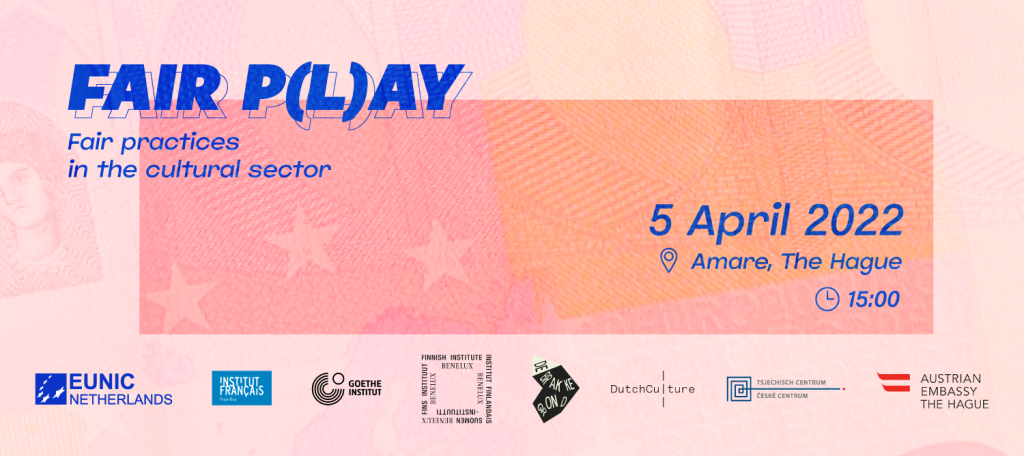

EUNIC Netherlands: fair practices in the cultural sector
FAIR P(L)AY is a cycle initiated by the EUNIC cluster in the Netherlands focusing on fair practices in the cultural sector, aiming to discuss and implement new and existing ways of creating fair environments in terms of funding, remuneration, copyright and mobility in Europe.


The cluster launched the first event of the series on April 5th at Amare, a brand new space in The Hague devoted to arts, home of Nederlands Dans Theater, Residentie Orkest, the Royal Conservatoire and of the former Zuiderstrandtheater. Colleagues from the working group of the EUNIC cluster in the Netherlands share their reflections on the importance of further work on this topic.
Why is the topic of ‘fairness’ and ‘fair collaboration’ so important to the EUNIC Netherlands? Was there a specific momentum that influenced the decision of the cluster to focus on this?
The situation of many artists has been precarious for years. Many cultural institutes and embassies receive requests for sponsorship, however often the budgets of these events and festivals do not include fees for artists. Organisers of these events justify the unpaid involvement of artists as a PR opportunity for artists the lack of dedicated budget for artistic fees. The second argument often used to justify unpaid involvement, is that artists love doing it. But loving your work does not mean doing it for free. Artists also have a normal life. They have to eat, drink, live and dress, and they have a family to care for.
Some institutes already started a long time ago rejecting requests for sponsorship that do not take into account artists' fees in their budgets. In summer 2021, in between covid lockdowns, a Formula 1 race was organised in the Netherlands. As a supporting programme, several artists were invited to perform for free so that the audiences would remain seated during the breaks and not walk around the edge of the circuit - and this in a period were festivals and concerts had been cancelled for over a year because of the pandemic. This was the trigger for starting this the EUNIC Netherlands programme of “Fair P(l)ay”.
As cultural institutes and representatives of embassies, we have a responsibility concerning the treatment of artists in general. We want to do our utmost for fair treatment of artists, (better) payment and better and fair working conditions. As EUNIC members we feel the duty to raise awareness regarding the issues concerning arts and artists. EUNIC can use its network to create a wider network with local partners, cultural organisations and artists to raise their voice.
In April this year the cluster has launched the panel discussion on ‘Fair p(l)ay’, what did you aim to achieve through this event? What are your main takeaways from this kick-off?
Efforts to improve the standing of professionals in the cultural and creative sectors are underway in Europe, both on the national or on the EU level. The COVID-19 crisis had a clear impact on arts and culture throughout Europe, striking in particular individual creators, artists and cultural professionals. While the legal standing of these sectors and their situation vary from country to country, several initiatives have been launched throughout Europe over the past years, aiming to raise awareness and establish fair practices among stakeholders.
The aim of the first panel discussion FAIR P"L"AY was to raise awareness and to connect different European initiatives so that their recommendations can be shared and applied within the cultural sectors across Europe. We also wanted to explore how European institutions and the EU play a role in this debate, with the participation of a member of the European Commission’s Directorate-General for Education and Culture. Furthermore, since digital technologies have transformed the way creative content is produced, distributed and accessed, we also wanted to discuss how these initiatives take into account the new Directive on Copyright in the Digital Single Market that came into force in 2019.
The EUNIC cluster Netherlands received a lot of feedback from the audience. Artists, cultural workers in the creative sector, all dealing with similar problems, such as poor payment and insecure working conditions, confirmed the need for a discussion on better conditions. Representatives of two Dutch platforms Engagement Arts NL and Platform Act were also actively taking part in the discussion. Connecting different European actors and initiatives promoting fair practices throughout Europe is therefore key to set standards on a European level. In this sense, the FAIR P(L)AY panels can be used as a platform for European initiative to connect, and best practices to be shared. The EUNIC Netherlands cluster will therefore organise and stimulate more activities regarding this topic.
Building on the engaged participation of the recent activity. What are the next steps for the cluster working on ‘fair topics’? How do you plan to link activities to the Dutch context and current dynamics in the country?
For some years now, there has been the so-called Fair Practice Code in the Netherlands, an initiative launched by Kunsten 92 that promotes fair conditions in the creative sector. It offers a guidance for fair practices in the cultural sector and a catalogue for fair pay. Since the Fair Practice Code was founded, numerous museums, theatres, and other cultural institutions have committed to this code and signed a declaration of intent. It was therefore very natural to engage in a discussion with Kunsten 92 to organize a discussion on the European level. During the search for local partners for this programme, EUNIC also came into contact with other initiatives in the Netherlands dealing with fairness in the cultural sector, amongst which Engagement Arts NL and Platform Act. Furthermore, it is useful and inspiring to stay in contact with all stakeholders, artists and organisations, and to get to know and understand the different points of view.
The Netherlands cluster would like to focus on the theme ‘fairness’ from the different perspective of the stakeholders of the cultural sector and facilitate the discussion on how current implications can be improved to generate a fair environment protecting the makers. Therefore, the upcoming editions of FAIR P(L)AY will take shape in a hands-on manner with a bottom-up approach. Precarity, temporality and gaps in the policy field are the subtopics that are also valid for the Dutch context. We are thinking to link the conversation that was sparked during the first edition to the European context through the emphasis on the EU Copyright Directive.
